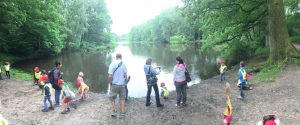I have been involved in many discussions about place based learning and the importance of field trips to a students learning process. Being given the opportunity to put theory into practice, learning in the classroom and exploring those concepts in reality. Field trips are a wonderful way to wrap up a unit, or a chance to experience education in a different setting. What I have experienced in Germany is that this is taken seriously. The students who I worked with are taken out multiple times per week for different activities and excursion. In two weeks, I accompanied my group to the gymnasium twice, the swimming pool twice, a forest and a bee farm and next weeks activity will be horseback riding. Most of these excursions are close by and are reached on foot, or public transit is taken.
The difference between my experience in German schools and Canadian schools is the amount of pedagogy accompanying these excursions. Canada provides teachers with learning targets for kindergarten students, whereas, to my knowledge, Germany does not. The field trips are random, and do not coincide with a pedagogical topic. But this does not mean that learning does not occur. Children between the ages of 3 and 6 pick up much of what they are told, they are able to recall and discuss something they experienced from a previous outing and make connections to current events or discussions. I believe the purpose of these frequent outings is not only to educate students, but to give them the opportunities to immerse themselves in their communities. Learning skills that will help them in real life and not just during their extended education. For example, starting at age 3, students learn how to take public transit, are provided with swimming lessons from a certified swimming instructor, given guided tours of a variety of knowledgable people. All the while they are encouraged to ask questions and explore interests. The downfall for me, is that these topics are not followed up in any way at school. They are experienced but not discussed. This does not take away from the value of the experience, however, I would argue that it ignores wonderful opportunities to teach in an in-depth way. If it is permitted to take students out of a school setting multiple times a week, I think that the things these students are learning should be reinforced and explored further. In Canada, field trips are carefully planned out, how will we get there, how many parent volunteers do we need, what do students need to bring, what will the cost be, etc. Since field trips are less frequent, they often relate to subjects that have been discussed in depth in the classroom.
I really see the value in both approaches, exploring the community on a frequent basis while relating the excursions to curricular content and units. I would really like to try to implement a more place based approach to my teaching. I believe that allowing students to make connections through experience will enrich their learning and hopefully enhance their interests.



 together, followed by more play time. Most days, there is some sort of special activity, twice a week, someone comes in and does music with them, once a week, they go to the local swimming pool and take swimming lessons, and then other activities are planned. This past week, we took all 25 students on the bus and the train to a forest to experience and learn about nature. We then went to a local outdoor market and ordered lunch before once again, taking the bus and train back to school. On Mondays, students are taken to a local gymnasium for physical activity. As far as I can tell, children do not attend traditional schools until grade one; kindergartens remind me of what North American’s would consider day care.
together, followed by more play time. Most days, there is some sort of special activity, twice a week, someone comes in and does music with them, once a week, they go to the local swimming pool and take swimming lessons, and then other activities are planned. This past week, we took all 25 students on the bus and the train to a forest to experience and learn about nature. We then went to a local outdoor market and ordered lunch before once again, taking the bus and train back to school. On Mondays, students are taken to a local gymnasium for physical activity. As far as I can tell, children do not attend traditional schools until grade one; kindergartens remind me of what North American’s would consider day care.